SpeakABLE
03/06/2018 11:52 AM
I’m happy to give extra credit to students who can attend this event and write a reflection -
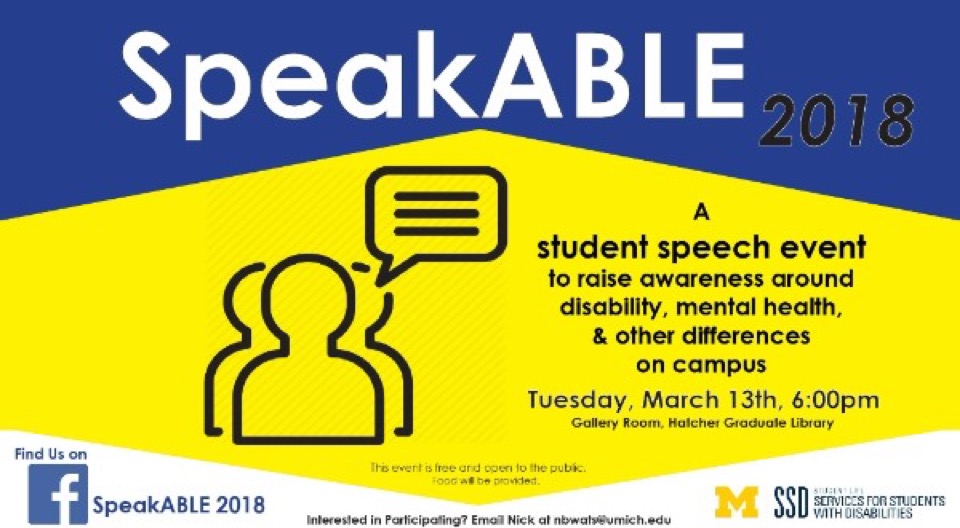

Join us for a student speech event to raise awareness around disability, mental health, and other differences on campus. |
Appropos of our discussion today...
02/12/2018 01:04 PM
Here’s the show I mentioned, which is partially a riff on what we were talking about today (hello, Irigary!) and partially a satire of shows like Serial.
Good Hair
02/10/2018 01:08 PM
This film came up in our discussion on Wednesday. Marlee mentioned shaving down (and growing out body hair) for swimming, and I was reminded of a quote later in this film. A woman says something like “how incredible is it that me letting my hair just grow out of my head is a revolutionary act.”
Trans Health in Detroit
01/25/2018 02:33 PM
| Trans Health Activism in Detroit: Moving Forward Together |
| Amara Marley |
| Brandi Smith |
| Lance Hicks, MSW |
| Tyffanie Walton, EIS |
| Moderator: Maureen D. Connolly, MD, Department of Pediatrics, Henry Ford Health System |
01/25/2018 02:25 PM
Another great opportunity for extra credit:
| Exhibition Opening & Artist Talk |
Our Love is Beyond Your Imagination
01/25/2018 02:24 PM
I’m happy to give extra credit to anyone who attends and writes a reflection.
Please join SAPAC's Consent, Outreach, and Relationship Education (CORE) Volunteer Program in welcoming Alex and Effee to campus for a talk about the intersection of queer, trans, and PoC identity and healthy relationships. Following the event, there will be a QTPOC safe space and refreshments will be served. We will be in the Anderson Room of the Michigan Union!
Interested in learning more about our speakers? Please visit alexandeffee.com
Cosponsored by the Office of Academic Multicultural Initiatives (OAMI), University of Michigan Spectrum Center, and Multi-Ethnic Student Affairs (MESA). Thank you!

Artwork by: Wang Zhao
Please join SAPAC's Consent, Outreach, and Relationship Education (CORE) Volunteer Program in welcoming Alex and Effee to campus for a talk about the intersection of queer, trans, and PoC identity and healthy relationships. Following the event, there will be a QTPOC safe space and refreshments will be served. We will be in the Anderson Room of the Michigan Union!
Interested in learning more about our speakers? Please visit alexandeffee.com
Cosponsored by the Office of Academic Multicultural Initiatives (OAMI), University of Michigan Spectrum Center, and Multi-Ethnic Student Affairs (MESA). Thank you!

Artwork by: Wang Zhao
Halfway Hijabi
01/18/2018 08:37 AM
Another wonder extra credit opportunity!
My name is Alyiah Al-Bonijim and I am a student at the University. Last year, my roommate and I created an event called “Halfway Hijabi: Hijabi Monologues” after the presidential elections in response to the escalation of hate crimes towards Muslim women who wear the head veil, or “hijab”. This year, Ayah Kutmah and I will be holding this event again. Similar to “Vagina Monologues” or “Mental Health Monologues”, the event will consist of a series of hijabi speakers who share their experiences through some sort of monologue piece (i.e. poetry, speech, music, etc). The direct visibility of being Muslim often means that hijabi women face the harsher brunt of Islamophobia and xenophobia. Additionally, within the controversial discussions of the hijab and Islam, the viewpoints and opinions of the Muslim women who wear the are rarely taken into account. Rather, we are spoken over, about, or for by those who do not understand the reasons behind and experiences of wearing the hijab.
Like every marginalized identity, there also comes an assumption of a homogenous and standard experience every hijabi endures. Muslim women who wear the hijab come from different walks of life, varying in race, ethnicity, sexuality, economic status, political ideologies, and so on. Ergo, this event was created in an effort to reclaim our voices within these narratives and discourses, as well as stress the intersectionality between other portions of our identities and the hijab. It was also created for others who do not understand those experiences, to have an opportunity to learn more about what wearing the hijab entails or means to us. With that being said, we cordially invite you to attend the event on February 16th, 2017, from 7-10PM in the Amphitheatre Auditorium in Rackham. Entry is free and refreshments will be served following the monologues.
Additionally, we kindly ask for your staff and student support (financial and/or otherwise) in promoting and sponsoring this event. We hope that, through this event, we can bridge the gap in understanding as well as create a comfortable space for those of any and all backgrounds. I have attached below a flyer, as well as the link for the Facebook event page, for advertising purposes for this event, if you are able to share it to others in your respective departments. Thank you in advance for taking the time and consideration in reading this invite, as well as for any type of support you choose to offer. Please let us know if you have any questions, comments, or concerns, and we hope to see you there!
Facebook Event Page Link:
https://www.facebook.com/events/1497595403692137/
Best,
Alyiah (alyiaha@umich.edu) and Ayah (akutmah@umich.edu)
My name is Alyiah Al-Bonijim and I am a student at the University. Last year, my roommate and I created an event called “Halfway Hijabi: Hijabi Monologues” after the presidential elections in response to the escalation of hate crimes towards Muslim women who wear the head veil, or “hijab”. This year, Ayah Kutmah and I will be holding this event again. Similar to “Vagina Monologues” or “Mental Health Monologues”, the event will consist of a series of hijabi speakers who share their experiences through some sort of monologue piece (i.e. poetry, speech, music, etc). The direct visibility of being Muslim often means that hijabi women face the harsher brunt of Islamophobia and xenophobia. Additionally, within the controversial discussions of the hijab and Islam, the viewpoints and opinions of the Muslim women who wear the are rarely taken into account. Rather, we are spoken over, about, or for by those who do not understand the reasons behind and experiences of wearing the hijab.
Like every marginalized identity, there also comes an assumption of a homogenous and standard experience every hijabi endures. Muslim women who wear the hijab come from different walks of life, varying in race, ethnicity, sexuality, economic status, political ideologies, and so on. Ergo, this event was created in an effort to reclaim our voices within these narratives and discourses, as well as stress the intersectionality between other portions of our identities and the hijab. It was also created for others who do not understand those experiences, to have an opportunity to learn more about what wearing the hijab entails or means to us. With that being said, we cordially invite you to attend the event on February 16th, 2017, from 7-10PM in the Amphitheatre Auditorium in Rackham. Entry is free and refreshments will be served following the monologues.
Additionally, we kindly ask for your staff and student support (financial and/or otherwise) in promoting and sponsoring this event. We hope that, through this event, we can bridge the gap in understanding as well as create a comfortable space for those of any and all backgrounds. I have attached below a flyer, as well as the link for the Facebook event page, for advertising purposes for this event, if you are able to share it to others in your respective departments. Thank you in advance for taking the time and consideration in reading this invite, as well as for any type of support you choose to offer. Please let us know if you have any questions, comments, or concerns, and we hope to see you there!
Facebook Event Page Link:
https://www.facebook.com/events/1497595403692137/
Best,
Alyiah (alyiaha@umich.edu) and Ayah (akutmah@umich.edu)
Lavendar Scare
01/18/2018 08:35 AM
Another wonderful extra credit opportunity!
I'd like to let you all know about an exciting event oSTEM is hosting next week!
LGBTQ+ History Seminar
On Monday, you are invited to The Lavendar Scare: a seminar on the history of LGBTQ+ people in national defense positions, presented by Chris LaFleur of Sandia National Labs.
The seminar will be held Monday, January 22 from 7:00 to 8:00pm in the Vandenberg Room of the Michigan League. Light snacks will be provided.
Well Wishes,
The oSTEM Board
I'd like to let you all know about an exciting event oSTEM is hosting next week!
LGBTQ+ History Seminar
On Monday, you are invited to The Lavendar Scare: a seminar on the history of LGBTQ+ people in national defense positions, presented by Chris LaFleur of Sandia National Labs.
The seminar will be held Monday, January 22 from 7:00 to 8:00pm in the Vandenberg Room of the Michigan League. Light snacks will be provided.
Well Wishes,
The oSTEM Board
01/12/2018 12:42 PM
Another great extra credit opportunity:

Care as Labor, Care as Ethics: Feminism and the Documentaries of Kamanaka Hitomi
Margherita Long
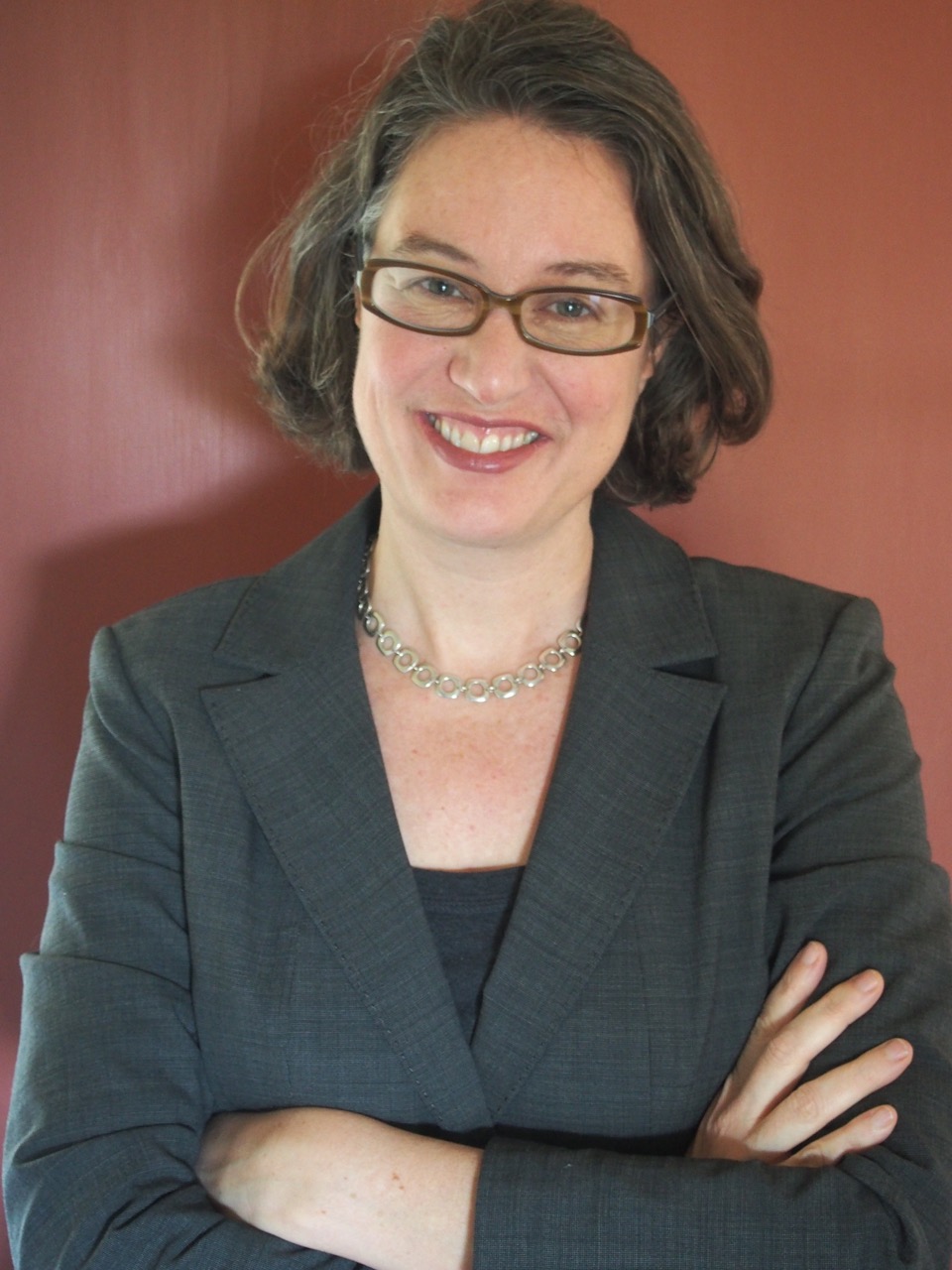

Care as Labor, Care as Ethics: Feminism and the Documentaries of Kamanaka Hitomi

High Stakes Culture 1/23
01/12/2018 10:47 AM
- Happy to give extra credit for this event, too:
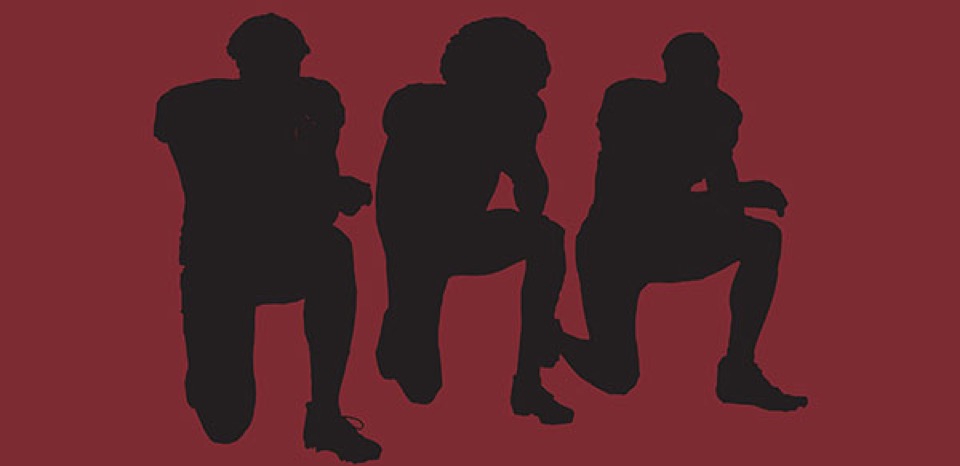
| When did sports and patriotism become so deeply linked? |
| Has the flag always been viewed as sacred and purely a symbol of the armed forces? |
| Where did the national anthem come from, and have people always stood when it is played? |
| Who gets to decide what symbols deserve respect and what counts as a gesture of respect? |
What is at stake in the ways we understand culture and cultural conflict? High Stakes Culture is a series that brings humanities perspectives to bear on current debates.
King Day Events
01/12/2018 10:42 AM
As I said in class, I’m happy to give extra credit to anyone who attends an event and writes a reflection about it.
Chandani sends in information about the many events scheduled for Martin Luther King day:
Keynote-specific info:
MLK Day (jan 15th)
Hill Auditorium, starts at 10am (doors open at 9:30am and it will fill up quickly)
Keynote Speaker: Hill Harper
See website for more info: http://oami.umich.edu/um-mlk-symposium/memorial-keynote-lecture/
Add'l info:
Getting your student org involved:
Getting involved as an individual:
Chandani sends in information about the many events scheduled for Martin Luther King day:
Keynote-specific info:
MLK Day (jan 15th)
Hill Auditorium, starts at 10am (doors open at 9:30am and it will fill up quickly)
Keynote Speaker: Hill Harper
See website for more info: http://oami.umich.edu/um-mlk-symposium/memorial-keynote-lecture/
Add'l info:
Finding events to go to:
http://oami.umich.edu/um-mlk-symposium/events/
- Most events are free, open to the public, and have free food!
- Be sure to check if the event needs an RSVP or ticket ahead of time
Getting your student org involved:
- Host a watch party on MLK Day (Jan. 15th) and discuss the keynote with peers: http://oami.umich.edu/um-mlk-symposium/watch-party-toolkit/
- Attend events together as a group (event page)
- Submit an event to be posted on our website: http://oami.umich.edu/um-mlk-symposium/events/submit-an-event/
- Consider collaborating with other organizations to increase your outreach!
- Structuring your event - idea sheet
- Funding opportunities and possible locations for your event sheet
Getting involved as an individual:
- Join the MLK Symposium Planning Committee - email mlksymposiuminfo@umich.edu to be added to the listserv
- Monthly meetings on Thursdays in Trotter (1443 Washtenaw Ave): 12-1pm
- FREE lunch!
- Give your input on the Symposium’s theme and booklet and plan for the upcoming Symposium
- Download the FREE app to get event reminders, stream the keynote lecture and more!
- Get our guide here: https://guidebook.com/g/umichmlk
- Tap the "Download" button to download the free Guidebook app
- Open Guidebook and you can find our "University of Michigan 2018 Annual Reverend Dr. Martin Luther King Jr Symposium" guide
Emergent Strategy 1/24
01/12/2018 10:41 AM
I’m happy to give extra credit to anyone who attends this event and writes a reflection about it.
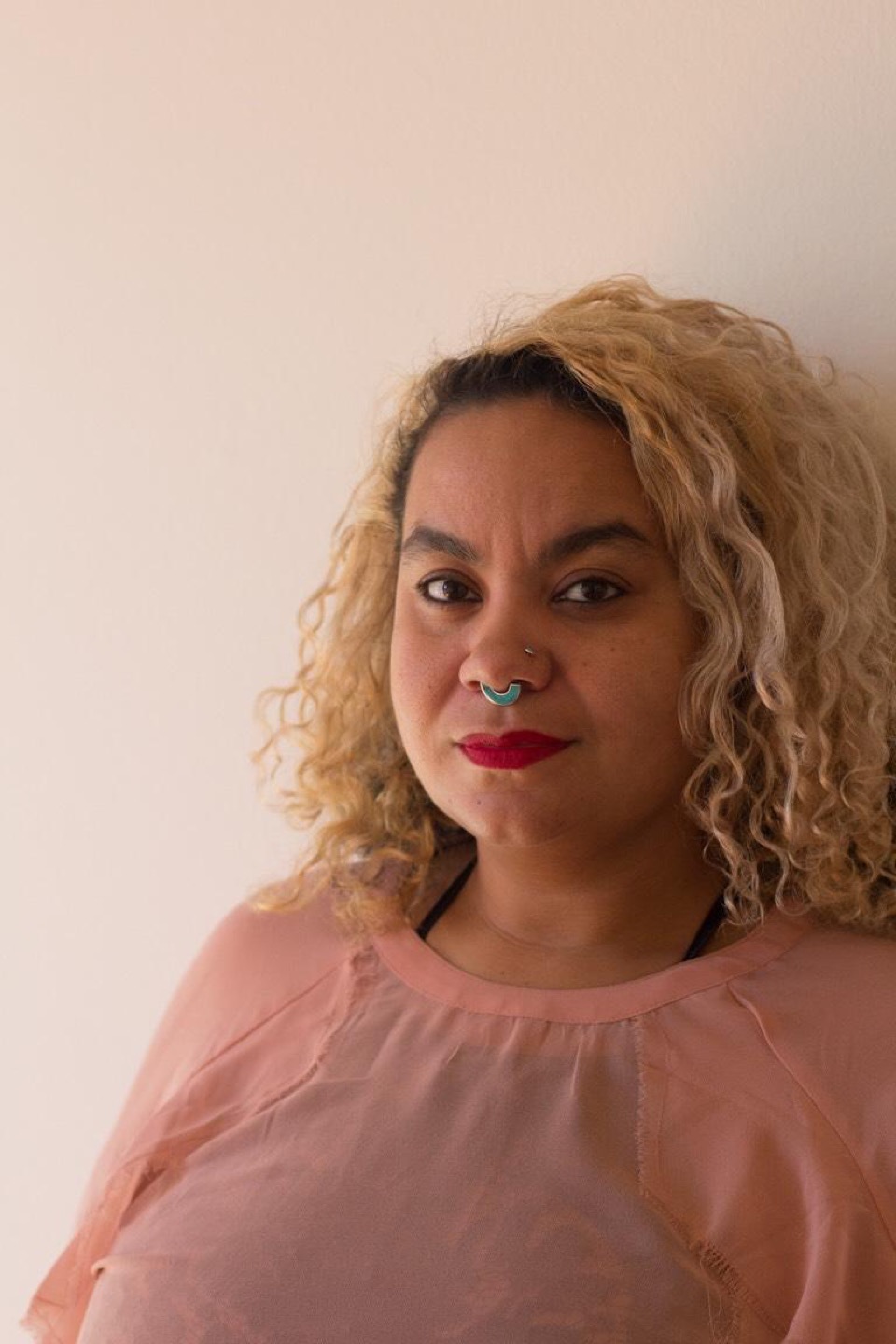
Co-sponsored by: The School of Social Work Community Action Research Learning Community, The Community Action and Social Change Undergraduate Minor, the Office of Diversity, Equity and Inclusion, Allied Media Projects, and Literati Bookstore
Emergent Strategy: Shaping Change, Changing Worlds |

| Lecture: 12:00 - 2PM January 24th, Educational Conference Center |
| Book signing will be hosted 1:30 - 2:00PM. |
| Book purchase will be available from 12:00 - 2:00PM |
First Extra Credit Opportunities
01/10/2018 11:50 AM
I’d be happy to give extra credit to anyone who attends these events and writes a reflection about them.

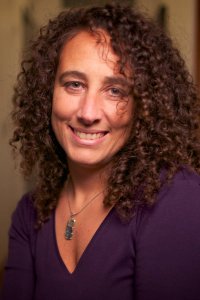
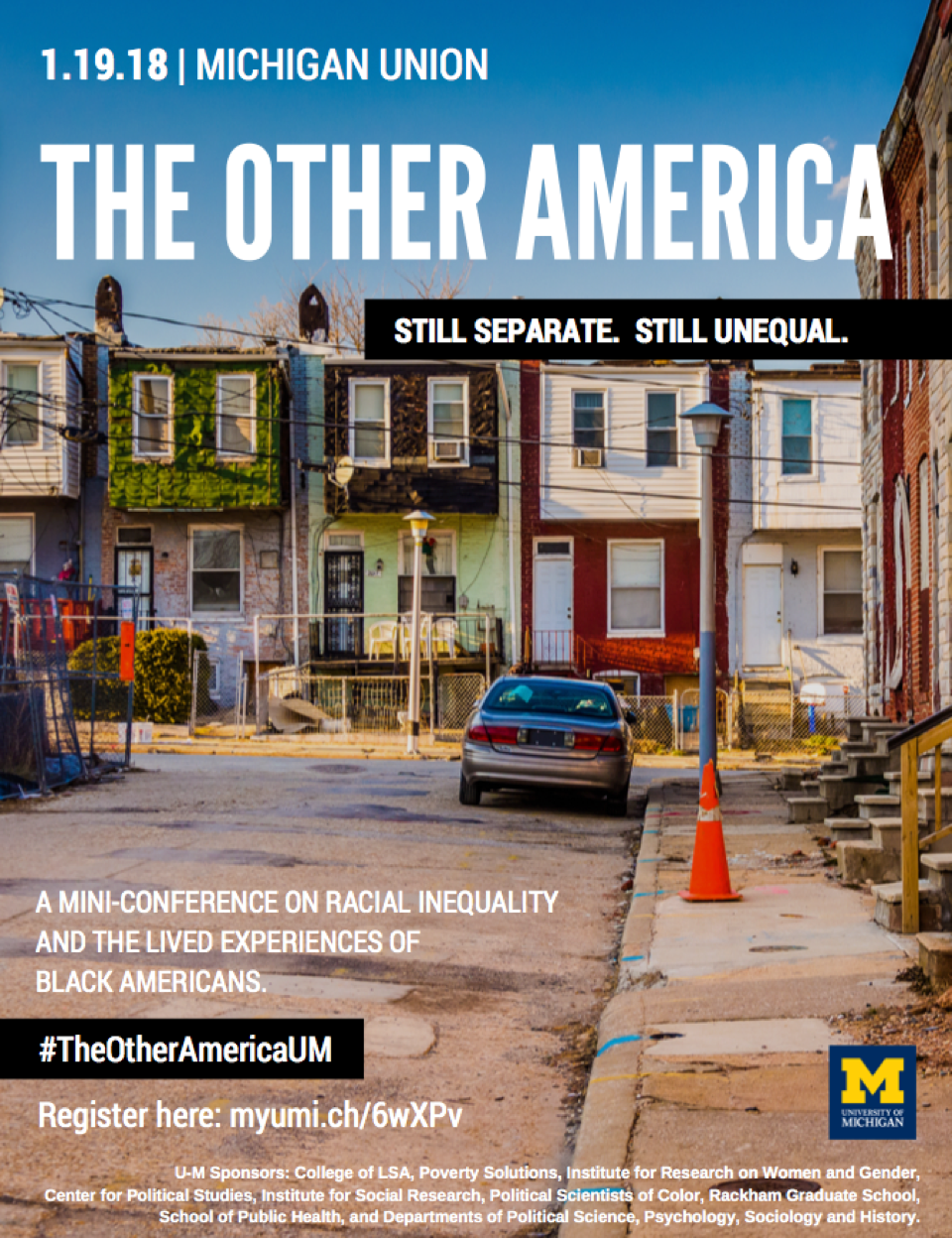
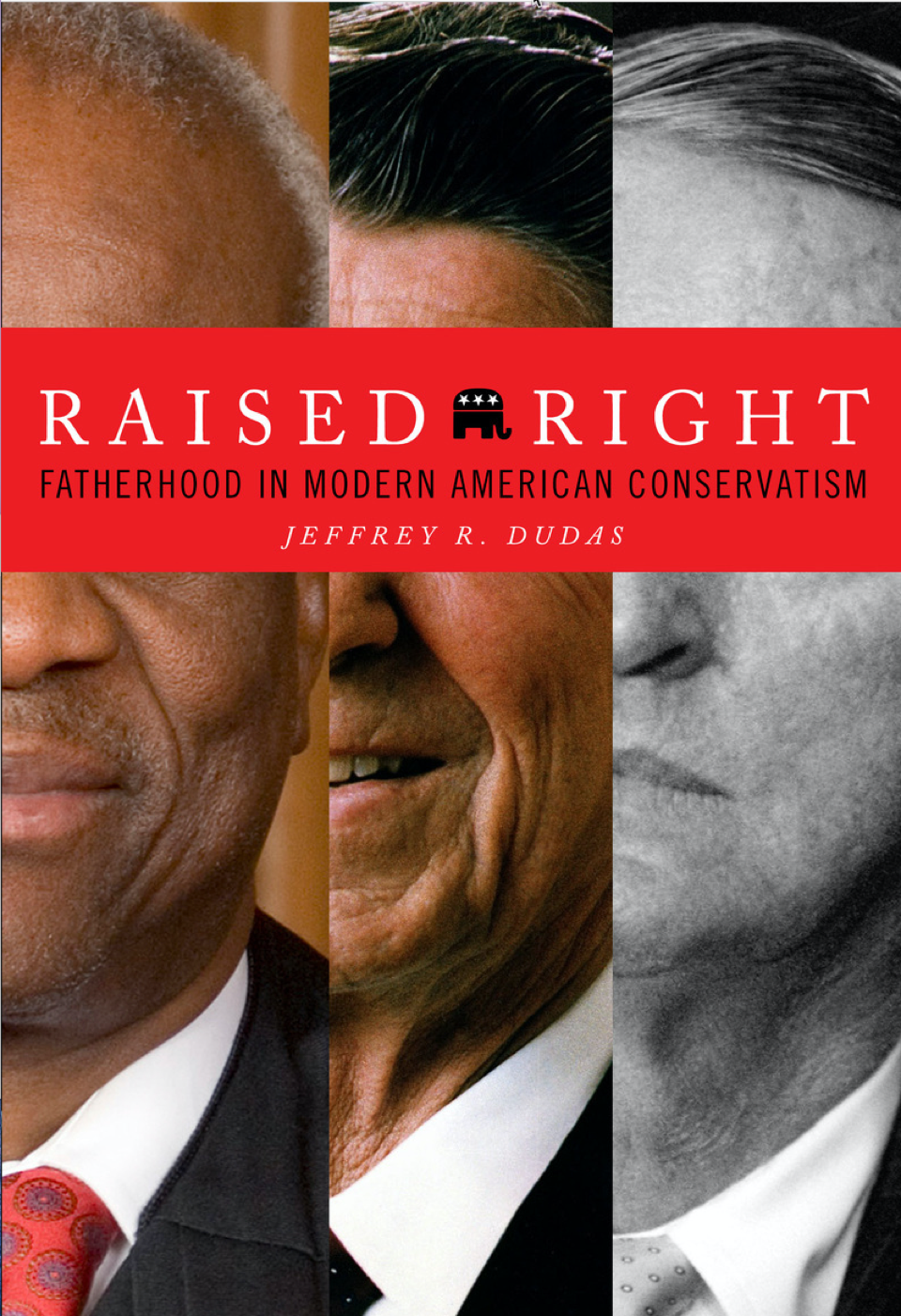
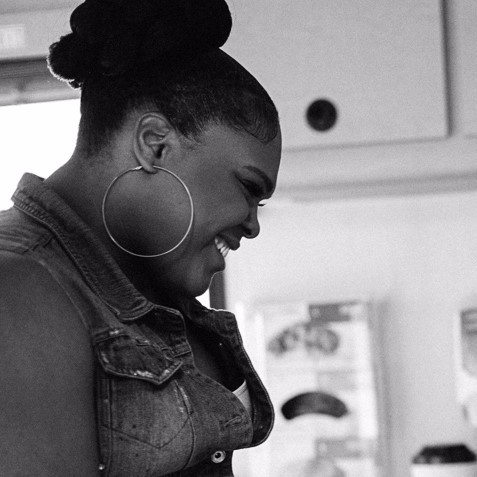
Detroit transgender and gender nonconforming communities are leading a movement to demand safety, opportunity, and access to health and wellness services. This panel will discuss the work being done as part of that movement at the Ruth Ellis Center, a youth social services agency that serves LGBTQ youth experiencing homelessness and residential instability. Speakers will include leaders from the Ruth Ellis community, as well as members of the medical and behavioral health teams.
This event is part of the university's annual MLK Symposium. Co-sponsored by the Department of Women’s Studies, Child and Adolescent Gender Clinic at Mott Children’s Hospital, the Spectrum Center, the Center for the Education of Women, and the College of Pharmacy.






| Amara Marley |
| Brandi Smith |
| Lance Hicks, MSW |
| Tyffanie Walton, EIS |
| Moderator: Maureen D. Connolly, MD, Department of Pediatrics, Henry Ford Health System |
Rebecca Solnit: If I were a Man
01/08/2018 08:58 AM
Sara Ahmed's Resignation
01/08/2018 08:56 AM
Orientalism and American Media Coverage of Japan
01/07/2018 06:37 PM
Because I mentioned this in our first meeting, I wanted to follow up. As I told you, when I talked with this reporter - who was clearly trying to get the story right - I wanted to use the term “orientalism” as a key term to describe my reaction to this (insane and yet totally expectable) Logan Paul story. As we discussed, sometimes theory and theoretical terms help and sometimes - especially when your interlocuteures don’t understand the terms you use - they really don’t. To me, the general American interest in this story is equal parts orientalism and a particular kind of toxic White masculinity via YouTube celebrity.
Inside Japan's 'suicide forest'
By Michael Nedelman, CNN
Updated 2:32 PM ET, Thu January 4, 2018
[...]
But when it comes to the now-viral YouTube video, the story is less about what sets Japan apart and more about how it's often perceived as "other" by Americans, like 22-year-old Paul, according to one anthropologist.
"His motivation to go to this particular spot is not an accident," said Allison Alexy, a cultural anthropologist at the University of Michigan who specializes in contemporary Japanese culture. "It is part and parcel of a larger American fascination" with Japan.
Inside Japan's 'suicide forest'
By Michael Nedelman, CNN
Updated 2:32 PM ET, Thu January 4, 2018
[...]
But when it comes to the now-viral YouTube video, the story is less about what sets Japan apart and more about how it's often perceived as "other" by Americans, like 22-year-old Paul, according to one anthropologist.
"His motivation to go to this particular spot is not an accident," said Allison Alexy, a cultural anthropologist at the University of Michigan who specializes in contemporary Japanese culture. "It is part and parcel of a larger American fascination" with Japan.
Policy on Tablets and E-readers
12/31/2017 02:20 PM
Do you know what it feels (and sounds) like to talk on the phone with someone who is watching tv or doing something else? That’s the feeling I’m trying to banish from our classroom. Although I know that people’s minds always wander - and that can be a wonderful thing! - I don’t want our preciously few hours together to have to compete with whatever’s happening on facebook, snapchat, or whatever app the cool kids are into these days.
Given my sense of the rewards for making our class free of digital technologies, what is my policy on tablets or e-readers (like ipads)? I understand that they can be really helpful although I am still convinced that almost everyone has higher reading comprehension on paper.
I am trying to avoid a situation in which students are more absorbed in their technology than the conversation or their own thoughts. If you can have an e-book in front of you and not be at all disassociated from the class, you are allowed to use it. However, please know that if I have to ask you to stop messing with whatever technology is near you, I will ask you not to bring it back. Therefore if you think you might have a hard time not using the e-book for anything other than looking up a quote or following along with someone else’s point, I recommend you print the readings on paper.
Also, please remind yourself that our phones, especially, are now literally being designed to make you never want to let it go, so you might feel some pangs of discomfort or confusion.

Given my sense of the rewards for making our class free of digital technologies, what is my policy on tablets or e-readers (like ipads)? I understand that they can be really helpful although I am still convinced that almost everyone has higher reading comprehension on paper.
I am trying to avoid a situation in which students are more absorbed in their technology than the conversation or their own thoughts. If you can have an e-book in front of you and not be at all disassociated from the class, you are allowed to use it. However, please know that if I have to ask you to stop messing with whatever technology is near you, I will ask you not to bring it back. Therefore if you think you might have a hard time not using the e-book for anything other than looking up a quote or following along with someone else’s point, I recommend you print the readings on paper.
Also, please remind yourself that our phones, especially, are now literally being designed to make you never want to let it go, so you might feel some pangs of discomfort or confusion.

Policy on Laptops and Cell Phones
12/31/2017 02:15 PM
Despite my own use of technology in and out of the classroom, I have a strong restriction against students using laptops or tablets* or phones in class. At the beginning of the semester, I want to explain my reasoning behind this policy.
I believe that it is incredibly hard not to multi-task when you are sitting in front of a screen, be it a TV or computer screen. And, although multi-tasking might feel good to some people at some moments, every piece of evidence I have ever read or experienced convinces me of the opposite. Multi-tasking hinders listening, thinking, engagement, and learning, all of which we are trying to maximize in the classroom.
More and more research makes clear that laptops do not help us think or learn in a classroom. Laptops, tablets, and phones are extremely distracting, both to the person using the person using them and, perhaps more importantly, the people around and behind the user.
Therefore, in my courses, I prohibit the use of laptops, tablets*, and cell phones for all students except those with demonstrable medical needs to use them. If you fall into this latter category, please email me within the first week of class.
To be clear, I think technology can be a wonderful thing and I have no problem with video games or blogs or cat videos, but only in the right context. I do not believe that having access to the internet’s firehose of information is good while you’re in a (brief) class session trying to think, listen, and share your ideas.
* I will permit students to buy and read e-versions of course books on a tablet, but if you bring that tablet to class you must only use it for looking up the reading.
Research that supports this policy:
Laptops Are Great. But Not During a Lecture or a Meeting.
From Facebook to Folsom Prison Blues: How Banning Laptops in the Classroom Made Me a Better Law School Teacher.
Is Google Making Us Stupid?
I believe that it is incredibly hard not to multi-task when you are sitting in front of a screen, be it a TV or computer screen. And, although multi-tasking might feel good to some people at some moments, every piece of evidence I have ever read or experienced convinces me of the opposite. Multi-tasking hinders listening, thinking, engagement, and learning, all of which we are trying to maximize in the classroom.
More and more research makes clear that laptops do not help us think or learn in a classroom. Laptops, tablets, and phones are extremely distracting, both to the person using the person using them and, perhaps more importantly, the people around and behind the user.
Therefore, in my courses, I prohibit the use of laptops, tablets*, and cell phones for all students except those with demonstrable medical needs to use them. If you fall into this latter category, please email me within the first week of class.
To be clear, I think technology can be a wonderful thing and I have no problem with video games or blogs or cat videos, but only in the right context. I do not believe that having access to the internet’s firehose of information is good while you’re in a (brief) class session trying to think, listen, and share your ideas.
* I will permit students to buy and read e-versions of course books on a tablet, but if you bring that tablet to class you must only use it for looking up the reading.
Research that supports this policy:
Laptops Are Great. But Not During a Lecture or a Meeting.
From Facebook to Folsom Prison Blues: How Banning Laptops in the Classroom Made Me a Better Law School Teacher.
Is Google Making Us Stupid?
Presentation by Amy Sherald
12/17/2017 08:40 AM
I found this interesting presentation from Amy Sherald, whose painting is elsewhere on this course website. You might have heard Sherald’s name when Michelle Obama picked her to paint her official portrait.


